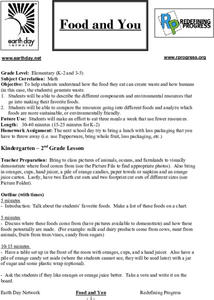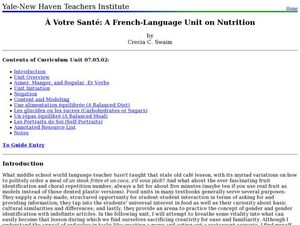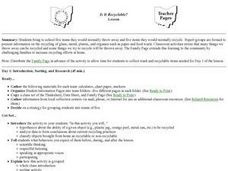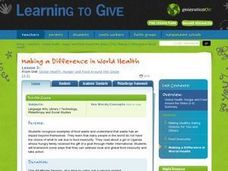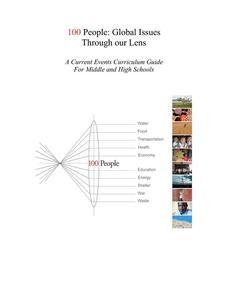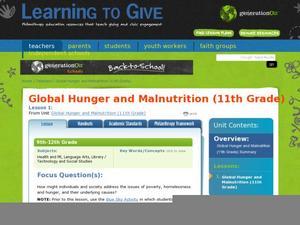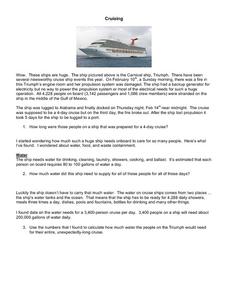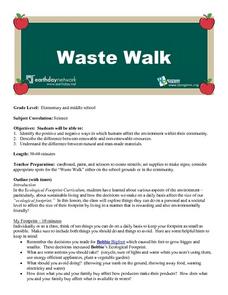Curated OER
Trash Check
In this trash worksheet, learners keep track of all the trash they accumulate in one day. They categorize the trash into groups including recycled, reusable, hazardous waste and food scraps. They brainstorm as to how they can reduce the...
Curated OER
Food and You
Students examine the types of foods they eat. They describe the different components and resources that go into making their favorite foods. They also compare the resources going into different foods and identify ones which are more...
Curated OER
Packaging: What a Waste!
Young scholars examine the environmental and economic impacts of excess packaging. They investigate the price and relative amount of processing and packaging of different food products in a local grocery store, analyze graphs, and...
Curated OER
Waste Management
Students investigate the amount of trash they generate, the problems that result and possible solutions.They complete four activities regarding household trash, biodegradability, packaging, and recycling.
Curated OER
À Votre Sant?: A French-Language Unit on Nutrition
Students discover the basic nutritional information for different foods. In this nutrition lesson students classify items, identify what a balanced diet is and determine what recipes are healthy.
Curated OER
What Happens to the Food You Eat? The Digestive System
Young scholars observe a video displaying body parts and functions of the digestive system. They make drawings of the digestive system from their observations. They act out a short play involving body parts.
Curated OER
Solid Waste Recycling
Students plan a "no garbage" lunch and hold a classroom contest to sort grabage into what can and what can't be recycled. They assess the importance of reducing the amount of garbage in the environment and set up a book recycling program.
National Park Service
Reduce Our Carbon Footprint, Let’s Compost!
Roll up your sleeves and get a little dirty with this elementary and middle school compost lesson. All you need is a large plastic container, a couple old newspapers, some organic waste, and a few hundred worms and you're ready to start...
Curated OER
Composting Leftovers
In this composting leftovers worksheet, students set up an experiment with food waste and soil, observing and recording the differences for two weeks.
Curated OER
Is It Recyclable?
Students bring to school five items they would normally throw away and five items they would normally recycle. Expert groups are formed to present information on the recycling of glass, metal, plastic, and organics such as paper and...
Curated OER
The Urban Explosion
Students investigate the uncontrolled development of the world's major cities. They define key vocabulary terms, view and discuss video excerpts, and complete a project that involves drawing a "perfect city," developing a plan to...
Curated OER
Protecting Our Planet
Young scholars examine the impact of pollution. For this pollution lesson, students watch Protecting Our Planet, then participate in a simulation of the effect of pollution on a variety of organisms.
Curated OER
Making a Difference in World Health
Students discover environmental awareness by conducting a collection project in class. In this global food lesson, students identify the importance of feeding all of the humans on Earth and discuss why some aren't properly nourished....
Curated OER
Horseshoe Crab Fun
Marine biology masters will meet the horseshoe crab and red knot shore birds that feast upon the crab eggs. Begin with a discussion and then have learners write postcards from each animal detailing their migration trips. A few math...
Captain Planet Foundation
P is for Poppies
Explore the way local farming and rationing helped the war effort in World War I with a lesson plan on gardening. After learning about trench warfare, reading "In Flanders' Field" by John McCrae, and studying poppies, kids discuss the...
100 People Foundation
100 People: Global Issues Through Our Lens
If the world were 100 people...17 would not have access to safe drinking water, 18 would not be able to read or write, and 52 would not have a primary education. Using the theme of "100 people," this resource explores other major issues...
Curated OER
Global Hunger and Malnutrition
Is there a difference between hunger and malnutrtion? Is this a problem only in third world countries? How does hunger and malnutrition affect the community? Why do these problems exist when the world produces enough food to feed...
Outdoor Learning Center
Outdoor Survival
Which of the following can you survive without for the longest time: water, food, or a positive mental attitude? The answer may surprise you. Guide learners of all ages through games, activities, and discussions about surviving in the...
Curated OER
The Nitrogen Cycle
The nitrogen cycle is the focus of a well-designed science lesson. In it, learners see that plants and animals produce waste products and decompose after death. Many of the waste products include nitrogen which is absobed by other...
SF Environment
Pre-School Composting and Recycling!
You can never be too young to get involved in composting or recycling. Here is a lesson that has been made for the very littlest learners and it's all about the importance of conservation. They'll sort compostable and recyclable objects,...
Curated OER
Cruising
Cruise ships offer many engaging opportunities for real-world math adventures. These large, floating cities use resources with numbers into the thousands place. Young mathematicians are asked to calculate numerical information relevant...
Curated OER
Recycling and Composting
Students set up composting sites that allow food scraps and paper to be recycled by nature. They are introduced to one aspect of recycling; composting. Students see how God recycles as the worms change garbage into something that brings...
Curated OER
Composting Presentations
Students create an presentation that suggests composting as a possible solution to solid waste issues. They research the types of solid waste that can be composted, the composting process and the role of worms in composting.
Curated OER
Environment: Waste Walk
Students assess the positive and negative affects of humans on the environment. The lesson explores ways in which individuals and societies can reduce the negative impact on the environment. By taking a "waste walk" around their campus,...
Other popular searches
- Science Project Food Waste
- Recycling Food Waste
- Food Waste Decomposers
- School Food Waste
- Food Waste Decompose Rs



